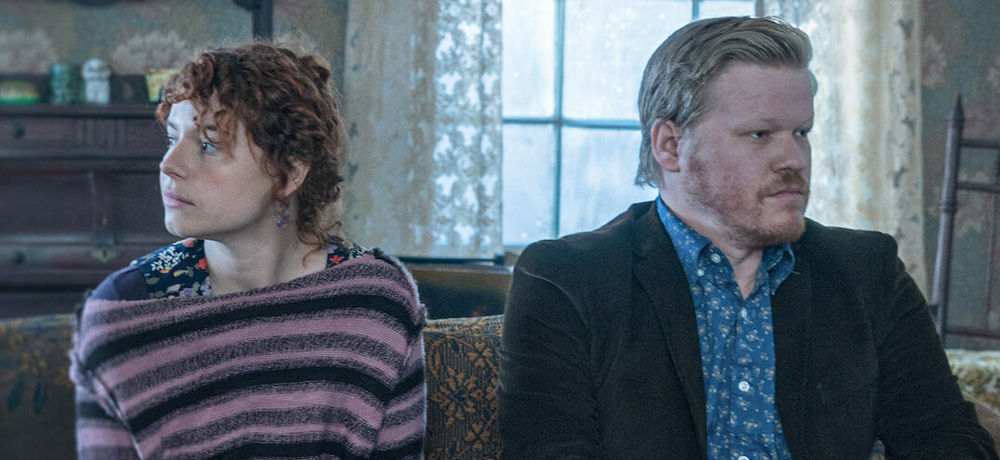


The backdrop of director Charlie Kaufman’s new film, I’m Thinking of Ending Things, is an oncoming storm, one that signals its foreboding nature with dark gray skies only to transition into a beautiful disaster of howling wind with pure white snow concealing every object in its path. It’s cold, lonely, and scary. Mr. Kaufman continuously tackles the human condition with profound insights into the delicate nature of relationships, connecting emotions that are both overtly fantastical yet overwhelmingly authentic.
Based on the novel by Iain Reid, I’m Thinking of Ending Things follows the budding relationship between Lucy (Jessie Buckley) and Jake (Jesse Plemons). They are on a road trip to meet Jake’s parents (Toni Collette and David Thewlis), who live in a country farmhouse. In the car, Lucy and Jake discuss, debate, and dissect philosophy, art, history, and even their own understanding of how their relationship came to fruition. Lucy, who narrates throughout as if we are sitting in her brain while she wanders from thought to thought, displays a keen intuition of numerous subject areas even though her thoughts are often obscured by random distractions. She examines Jake and his quirks while musing “I’m thinking of ending things” when it comes to their ongoing relationship. She will explain to Jake that she doesn’t care for poetry and then recite a beautiful verse she claims to have written herself. She consistently contradicts herself.
Kaufman has never studied relationships, especially romantic ones, through an ordinary lens. He has a way of making the analysis of humans and their connection to romance and love so brutally simplistic while at the same time making it feel so uniquely intricate. It’s almost otherworldly, as if we have been sent to an alternate universe where everything we know and understand, that is predictable and reliable, is somehow jeopardized by an off-kilter object, word, or characteristic.
You can see Mr. Kaufman’s particularly unorthodox methods for constructing the cynical and fanciful flights of naïve and unbridled passion for life, love, and self in the emotionally complicated stop-motion-animated story Anomolisa and the reality-challenging nature of a theater directors’ self-indulgent quest for control in Synecdoche, New York. The emotional elements explored in these films are further searched in I’m Thinking of Ending Things: the struggle for control in a relationship, specifically from an insecure man who challenges and becomes moody in the face of uncontrol; the obsessive nature of romance, challenged by a woman who is unsure about the man she has chosen and whether the feelings she is experiencing are real or part of another construct she hasn’t figured out yet; and the thin line that exists between the identity of reality and fiction, displayed by Jake’s parents who age older and younger every time they leave the room.
Kaufman spends his time with Lucy and Jake, allowing the viewer to find connections with their personalities and emotions before adding strange events into the mix, like the family dog who endlessly shakes or a picture on the wall that is all too familiar to Lucy. Still, dinner with the parents is just half the story. There is an adjoining story woven through Lucy and Jake’s experiences, a story of a lonely janitor at a high school who wanders the halls cleaning and encountering young people throughout the school. The character arrives into the story during interesting spells of conversation at the contentious family dinner. It’s never completely identified but the janitor’s role seems connected to Jake and his family. The couple eventually leave the house and venture back into the wilderness of white snow in an effort to get home before things get worse.
Kaufman layers the film with references, including callouts to David Foster Wallace, Mussolini, Tolstoy, and John Cassavetes. The dialog is dense, deliberate, and distracting; Kaufman roams Lucy’s spiraling thoughts, switching from conversations with Jake to internal monologues with herself. Lucy is a character composed of doubts about everything around her. Are her insights trustworthy? Is she faking something to pretend to be something else? There is no simple answer, and that’s part of the intriguing nature of the film, making everything feel uneasy, lonely, and desperate.
Some have called this film Charlie Kaufman’s horror film. While it does not meet the standards that typically define the genre, this film still finds a realm to explore that has all the feelings associated with the genre of horror, but in an unconventional way. The unease of the unknown, the creepiness of coincidences too familiar, the fear of discovering hidden intentions within others and, specifically within this film, yourself. It’s all there, shaped and molded in a way that is distinctly Charlie Kaufman.
I’m Thinking of Ending Things is confusing yet fascinating. At times I figured it out, other times I was completely lost. The subtle, superb performances from Jessie Buckley and Jesse Plemons completely consume the viewer to indulge the 2-hour-plus story. All the feelings produced throughout the film challenge one another: it’s interesting and infuriating, sometimes at the same time. But altogether it is simply pure cinema, another highlight in the career of Charlie Kaufman.
Movie Score: 4.5/5